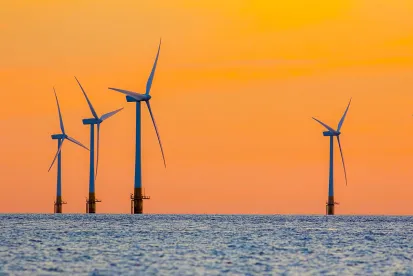With the expected boom in US offshore wind construction, all participants in the process should adopt important risk management approaches to avoid problems and disputes that drive up costs and cause delays. This article highlights the important concepts of coordination among the parties and the use of an independent disputes advisor to resolve issues in real-time during construction.
The technical and logistical complexity of offshore wind projects — in consideration of seabed conditions, use of support vessels, sub-sea cabling, larger components, floating platforms, and extreme weather, to name a few such factors — makes such projects particularly susceptible to the risk of construction disputes.
With the preferred procurement approach in offshore wind projects being a single developer awarding multiple contracts to specialized contractors and suppliers (turbine manufacturer, cable supplier, foundation fabricator, transportation provider, installation contractor, etc.), the need for extensive interfacing among these separate contractors adds another level of complexity and risk.
Long before construction starts, when the developer is drafting contract documents for all its contractors and suppliers, the developer must recognize and address the critical importance of interfacing and coordination with and among all those parties.
-
The developer should prepare contract provisions and related technical requirements that address coordination, scheduling, and timely notice responsibilities across the construction and supply contracts. Doing so will promote and facilitate active and joint participation by all involved parties throughout the planning and construction stages. Such provisions should be mirrored in all the involved contracts, to the extent practical. While there may be some shifting provisions, the most important aspect is to establish the forum and the processes that will help all parties avoid and mitigate the risks of coordination problems and disputes.
-
Contractors should actively want to and be required to participate in coordination meetings with the developer and other contractors. The various contracts should mutually require parties to provide timely feedback on interfacing and overlapping concerns such as scope gaps, responsibility and liability matrices, and project scheduling.
-
Contractors should also memorialize coordination responsibilities among them in the form of interfacing or coordination agreements. Part of these coordination responsibilities should include prompt notice requirements to the developer and contractors as issues or delays arise.
-
As much as reasonably possible, the developer should attempt to allocate risks between the parties best capable of preparing for, assuming, and mitigating those risks. In turn, contractors should avoid assuming risks and being responsible for issues outside their control, including early project delays or supply chain disruptions.
-
The developer should consider appointing an independent disputes advisor to resolve contractor disputes as they arise as a means of trying to resolve issues and avoid expensive litigation.
-
In the event a dispute cannot be resolved by the independent advisor, the developer should ensure the formal disputes resolution procedures are aligned among the contractors, and consider including discretionary language about the developer’s right to consolidate disputes on a project.
Implementing these risk management approaches into your offshore wind contracts now should lead to better communication and transparency among the parties during the project and help the parties avoid expensive litigation in the future.





 />i
/>i

